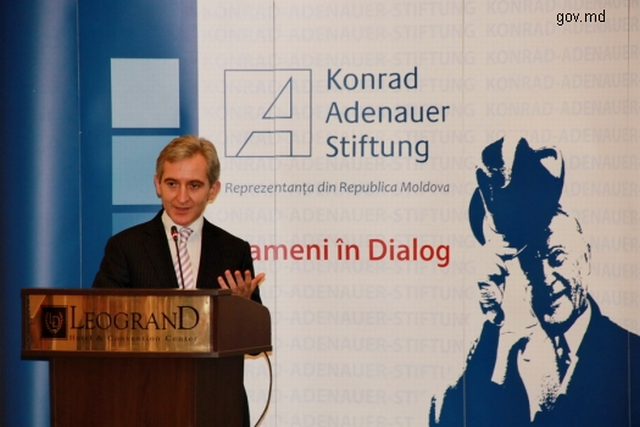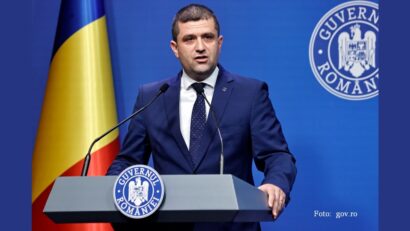Moldova’s European Course
Romania stands by Moldova in its European integration path

Corina Cristea, 21.11.2014, 13:11
The main reason for which the Republic of Moldova is not in the European Union next to its former Soviet peers such as the Baltic countries is the hesitation shown by the political class and society with regard to the country’s development. This is the opinion expressed by Prime Minister Iurie Leanca at the forum ‘The Future of Moldova in the EU’, recently organized by the Konrad Adenauer Foundation in Chisinau. The Moldovan official said that Moldova and Latvia were in 1991 two Soviet republics with similar levels economically and socially.
Today, Latvia sports 300-Euro pensions, an average national wage of 800 Euros, farming subsidies worth 180 Euros per hectare, enjoying social and political security. He said he was confident that Latvia did well as opposed to his country, not for Moldova’s lack of intelligence and diligence, but because of its constant hesitation since 1991. In his opinion, Moldova faltered because it did not have a clear objective, a vision on the future of the country, and the kind of political system it wanted, an anchor as it were, as well as rules to impose. As a result Moldova still has weak institutions, strongly influenced by politics. However, at this time Moldova is closer to Brussels than ever.
President Nicolae Timofti said he was confident that his country would apply for EU membership in 2015, after the parliament elections on November 30, when the current pro-European governing coalition will face off against leftist parties, who wish to be closer to Russia. He said: “The status of candidate country will accelerate the modernization of state institutions, allowing better security for the Republic of Moldova”, recalling the importance of the November 30 elections for Moldova’s European course. “Earning the status of candidate country will embolden integration policies, contribute to the modernization of public institutions, and place Moldova in a conventional security space, sheltered from the challenges in the region”, the Moldovan leader said. The ratification by the European Parliament of the Association Agreement between the Republic of Moldova and the European Union was seen as a major accomplishment for both Chisinau and Brussels, essential in increasing transparency and economic growth, supporting the stability and prosperity of the country. The agreement was signed on June 27 2014 in Brussels, then ratified by the Moldovan Parliament on July 2nd.
The most recent opinion polls show that pro-European parties are slightly more popular than the pro-Russian ones, who promote integration in Eurasian structures. Moldovan analysts do not rule out the need to form a wide based coalition government, including the communists, if the pro-Western parties do not get enough votes to hang on to power. Here is Radio Romania’s correspondent to Chisinau, Vasile State:
“Six political parties are believed to make it to the future single-chamber Parliament in Chisinau, according to the poll run by the Institute for Public Policies. Three of them, the Liberal Democratic Party, the Democratic Party and the Liberal Party have clear pro-European leanings, while three more, the Party of Communists, the Party of Socialists and the Motherland Party are inclined towards Russia. We have to specify, however, that ex-president Vladimir Voronin’s party, who are communists, announced that they would not denounce the association agreement with the EU. According to the poll, if parliament elections were held next Sunday, the three pro-European parties would get a cumulative 33%, while the other three would get 29% of the vote. Even so, forming a parliament majority would be extremely difficult, considering the ratio of strength of the two sides.”
Arcadie Barbarosie, director of the Public Policy Institute, does not rule out a coalition between the pro-European parties and the Party of Communists:
“We should maybe think of a wide coalition with the possible participation of the communists, a coalition that would provide political stability for the next six years. If in two years time we don’t have a president, we will have early elections, so we need something that lasts 4 to 6 years, something with relative stability.”
According to sociologist Ion Jigau, a possible alliance between communists, socialists and the Motherland Party would not provide stability for the Republic of Moldova.






























